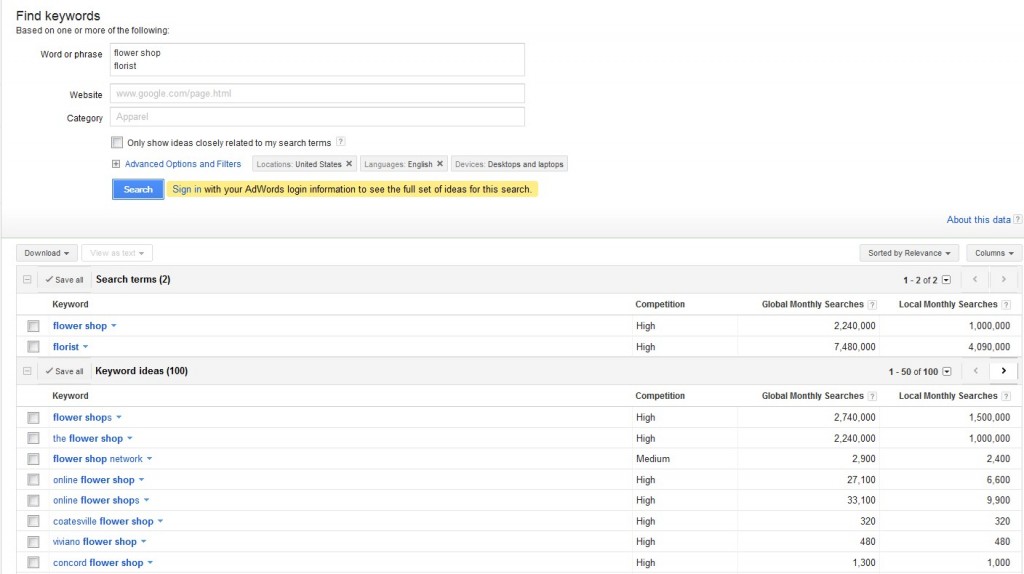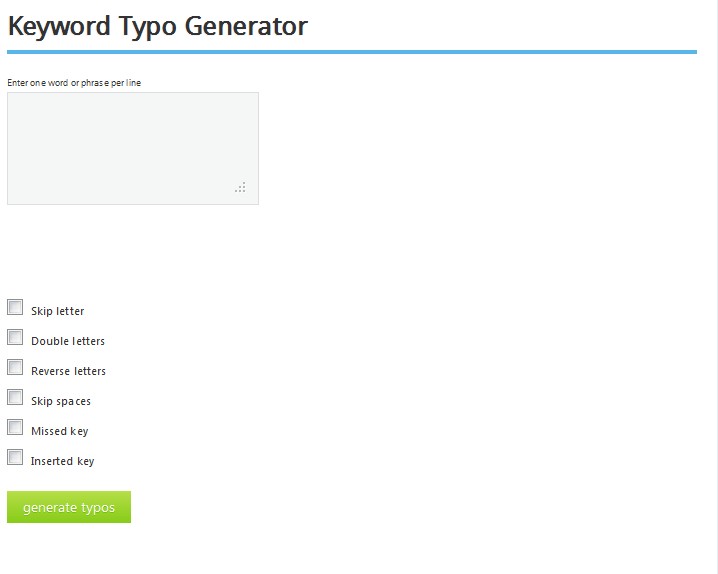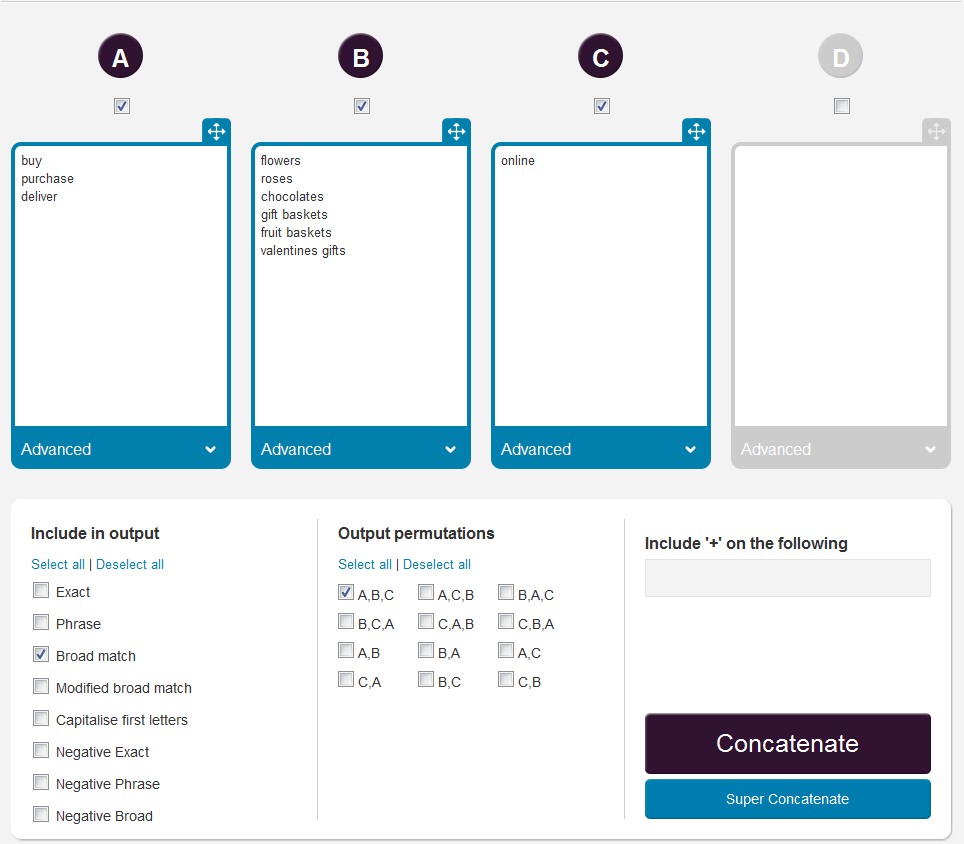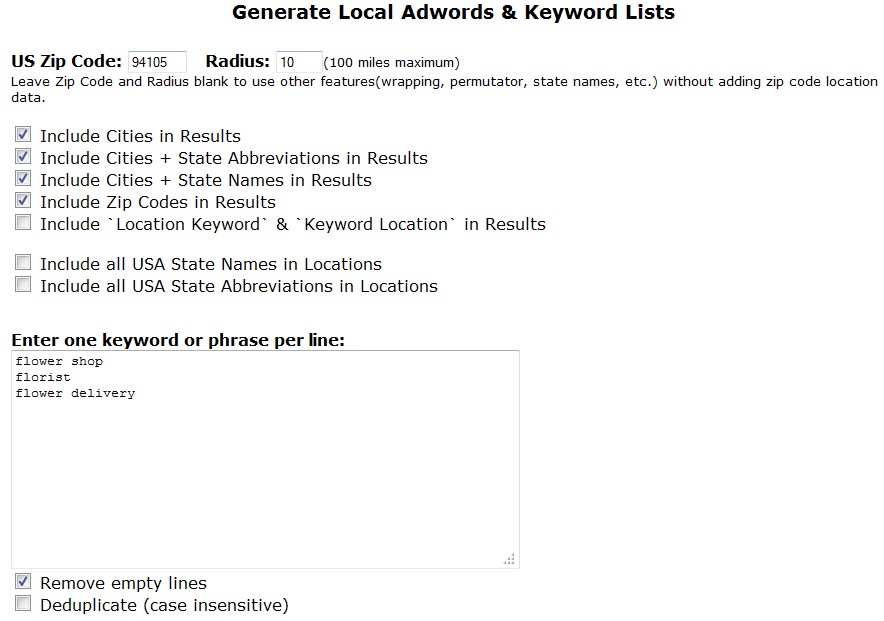
9 Free Killer Keyword Research Tools
When launching, adjusting or creating search engine optimization (SEO) and search engine marketing (SEM) campaigns, you work with a ton of keywords (words you choose and want to rank well in search engine results). In the SEO/SEM world, keywords can be a marketer’s best friend if chosen wisely! The keywords you choose for your Pay-per-click (PPC) online advertising campaigns can ultimately determine the success or failure of your campaign. In order to succeed, you need to find a good mix of different keywords, from branded to non-branded, to competitor’s terms, as well as generic and long-tail terms. There are plenty of excellent paid or free trial PPC keyword research tools. However, you can create a really extensive keyword list with tools that are 100% free – Sweet!
Here are 9 free killer PPC keyword research tools with no usage limitations or pay gates.
1. Google Keyword Tool
This is a Google Adwords keyword research tool. This is also a go-to keyword research tool for both keywords to bid on, as well as keywords to exclude from campaigns. There’s a lot of flexibility with Google’s tool, including match type, location, and language, as well as an option to show closely related search terms.
You can also search for keywords by entering a website domain. Google will then return search terms that it determines are relevant to that website. Use this tool to check competitors or other high-ranking organic domains to discover new keyword ideas.
Bonus: You can also use this tool to see what keywords your competitors rank well in on Google organic search results. Check your own website to see keywords Google thinks are relevant to your website. If the keywords returned don’t really describe your core offerings, you might need to spend more time on search engine optimization.
2. Microsoft Ad Intelligence Tool (Excel Add-on)
This is a PPC keyword research tool and Excel add-on for Bing Ads. This tool requires a Bing Ads advertising account. Once installed, the tool is available as a new tab in your Excel workbook. You can discover new keyword ideas by entering the URL of your website or a list of keywords. The tool also gives traffic and bid estimates on your keywords, which allows you to determine the cost of advertising on Bing/Yahoo. There’s also some interesting demographic and geographical information available.
3. Keyword Typo Generator
People often misspell or hit the wrong key when they type a word into search. SEOBooks keyword typo generator helps generate a list of the most common misspellings for a particular keyword. We recommend that you use this tool on your branded terms and high traffic head terms (high-traffic keywords are usually less targeted keywords, consisting of single words or very short phrases, etc.). You don’t have to run this on long-tail keywords with very low traffic/search volume.
4. Keyword Concatenation Tool
This keyword concatenation tool from Found.co.uk helps you build a large list of keywords. The tool also includes inputs that include match time modifiers and different permutation outputs. You could concatenate a “buy” modifier to your product list to create a keyword list of “Buy + products,” for example. This is all just fancy/techy lingo for joining large lists of keywords with ease and switching between paid search match types.
5. Local Keyword Generator
This local keyword generator tool is great for businesses trying to advertise in a specific geolocation. Just enter a zip code and a radius of up to 100 miles. Then, a list of keywords that are relevant to your business. The tool will create a list of keywords using all the cities and zip codes within the radius. This is incredibly useful for brick and mortar stores that want to create a list of keywords that target the business’s general area.
6. WordStream
A Boston-based internet advertising business called WordStream concentrates on social media and sponsored search. However, WordStream offers a wide range of complimentary tools that are intended to assist customers in assessing the effectiveness of their digital marketing, in addition to its fee-based software and consulting services.
The tool offers choices to examine keyword ideas based on a certain URL, industry, or geography, which is helpful if you want to improve your SEO. It works for both Google and Bing. You may quickly get a list of 25 recommended keywords by entering your chosen term, setting your criteria, and clicking the discover my keywords button. The cost per click (CPC) and competitiveness for each term on Google and Bing are also shown.
7. SEMrush
SEMrush is unlike your standard keyword research tool since it provides several additional features. SEMrush offers 5–10 very precise keywords that your rivals are currently using rather than just coming up with a list of potential keywords.
Additionally, it includes one of the most accurate and comprehensive lists of “competing websites”, which will display the competitiveness of your rivals. It implies that you may easily search through all the other significant websites in your industry and go deep into a competitor’s website.
Unlike other SEO keyword research tools, you don’t need to submit a seed term to start searching. Instead, simply type in the website’s URL to start your investigation. You may see keyword ranks in addition to detailed information on traffic statistics, Ads CPC, domain comparisons, keyword difficulty, and much more.
SEMrush provides a 7-day free trial of the service. Although you must provide the credit card information to access the trial, there are no fees if you decide to end your membership before the 7-day trial is over. SEMrush also provides information on the top sites that are ranked for certain keywords. This knowledge generates suggestions for fresh subjects to write about in a blog article.
8. KWFinder
If you want a tool that is simply concerned with keyword research, KWFinder is your best choice. They are one of the SEO tool companies with the fastest growth rates while being a newbie to the field.
Using the Questions-based Keyword Research tool, you can find problem-solving-related long-tail keywords quickly. You may utilize KWFinder to find the keyword to help you produce highly targeted traffic. Content that offers solutions boosts conversion and focused visitors.
KWFinder offers both paid and free options. For most users, the basic package is the best option. Join a free 10-day trial to try out the KWFinder keyword research app.
9. Ahrefs
One of the top keyword research tools for content authors nowadays is Ahrefs. This tool gives users a comprehensive keyword report and uses clickstream data to provide distinctive click metrics.
You can examine your competition’s organic keywords, backlinks, and PPC efforts. This keyword research tool provides you with the most relevant keywords, the most popular content subjects, the greatest backlink chances, email notifications whenever your company is mentioned online, and more.
Over 19.2 billion keywords and 10 billion indexed pages are available in Ahrefs’ database. Because of this, Ahrefs can provide its consumers with the highest level of accuracy and data.
Conclusion
These are some of the top keyword research tools in the SEO industry. Analyze your budget first, then think about the main goal of your brand’s SEO strategy to choose the one that works for your company.
The more thoroughly you create a keyword list, the more opportunities you’ll have to capture more traffic and, hopefully, conversions/sales. The time and effort you put into creating an extensive keyword list should pay off. You can keep your PPC costs down by bidding on low-competition keywords.
Are you using any of these keyword research tools? Did we leave any of your favorites off the list? Let us know in the comments.
© 2013 – 2018, Contributing Author. All rights reserved.








